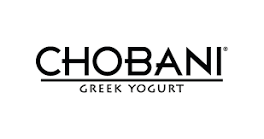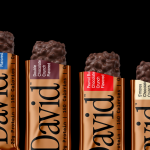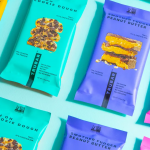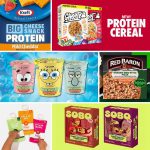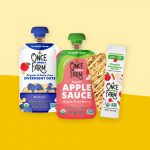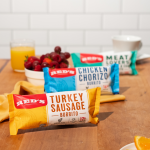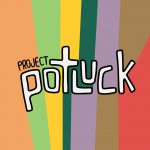Chobani Moves to Center Store with Super Peanut Blends Launch
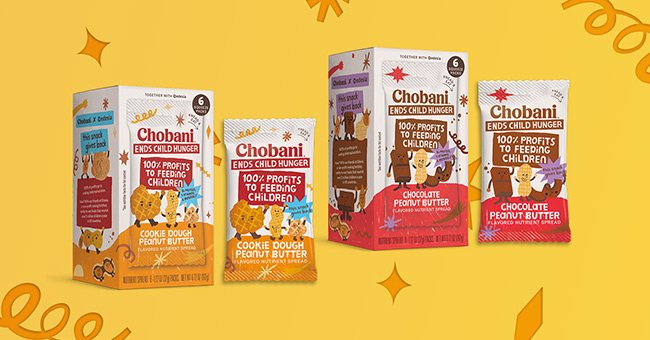
Chobani is breaking free of the cold case: the company has quietly launched a line of enhanced peanut butter in partnership with nonprofit Edesia, a former Chobani incubator participant. The butters, which debuted last year in limited release, now sport refreshed packaging designed to stand out on store shelves.
Currently the Super Peanut Blends, as Chobani calls them, appear to be sold in Publix locations and through Fresh Direct and Amazon. Though the line has one overarching name, it actually consists of two sub-lines aimed at different end consumers and use cases which are delineated via callouts on the packaging.
Three of the products in the line are nutritionally enhanced peanut butter packets aimed at older children and adults. Available in plain, chocolate and cookie dough flavors, as well as variety packs, these are sold in 6-count boxes of 1.12 oz. packets for $5.99. In addition to peanuts, the products contain added protein (8 grams per serving), plus vitamins and minerals from a combination of whey protein isolate, milk minerals and a “nutrient extract blend” of spinach, broccoli, sweet potatoes, mushrooms and sunflower seeds.
Chobani’s other two Super Peanut Blends are positioned as a means of introducing infants to peanut allergens. Available in banana and apple flavors, the infant varieties are sold in 6-count boxes of 0.7 oz. packets for $5.99, with variety packs also available. Unlike the other SKUs, these two varieties have a shorter ingredient list of just peanuts, fruit, oils and skim milk.
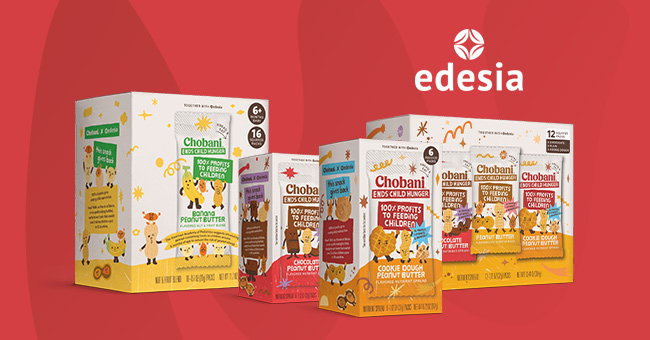
Formed in 2009, Edesia is an international nonprofit organization best known for providing a therapeutic food called Plumpy’Nut to malnourished children in need. The group launched MeWe in 2019 as a way to introduce children to peanuts and potentially prevent food allergies, ultimately adding adult and kids enhanced nut butters as well. MeWe’s website has been taken down and the line is currently unavailable on Amazon, but the product bears strong similarities in flavors and nutritional facts to Chobani’s new products.
While the Super Peanut Butters are just now popping up on store shelves, Edesia took part in Chobani’s incubator for emerging brands in 2019, and in June 2020 MeWe shared on Instagram the launch of a new product.
“This morning our fearless leader [Navyn Salem] drove three hours from Rhode Island to NYC in a Uhaul to deliver packets of a new peanut butter created by [Chobani] and [MeWe Nutrition].” the post said.
Chobani’s website also currently features the new line, albeit with different packaging than has been spotted in stores. While the design in retail features abstract shapes and illustrative representations of the ingredients within, the newer packaging sports humanized caricatures of peanuts, cookies, and other ingredients.
Both the old and new looks do share one important callout: 100% of profits go to “feeding children” and “ending childhood malnutrition.”
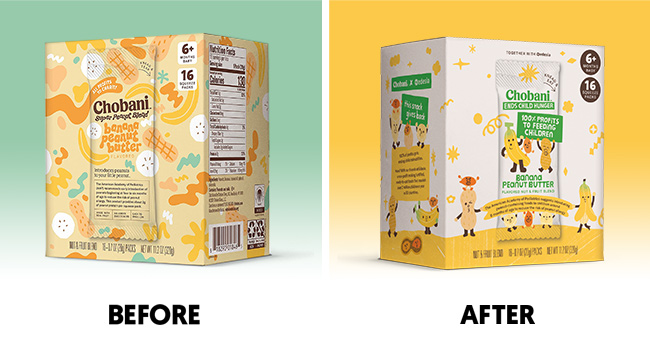
For Chobani, partnering with a nonprofit is not a surprising move. The company’s founder and CEO Hamdi Ulukaya has long advocated for businesses to be a source of change, and the company has often launched products or services that have a give-back component. For example, its new Mangos and Cream yogurt was developed with UNSTUCK, an extension of nonprofit The Tent Partnership for Refugees.The new center-store products, however, represent an ongoing evolution for Chobani, beyond its original Greek yogurt product line, and come soon after the company confidentially filed for an IPO. But embracing added functionality is a relatively new positioning for the brand, which recently launched its Complete line of yogurts and drinks with added protein and fiber.
It remains to be seen if Chobani can carve out a niche in center store as it was able to do in yogurt. For the products focused on older children and adults, the move to utilize peanuts as the base could be limiting, with many schools banning the consumption of peanuts due to allergies. Still, the line fills a need: other enhanced nut butters on the market have largely have focused on the ketogenic diet, offering added fats and no sugar, or are more specialty products with ingredients such as CBD.
On the infant side of the business, there’s some competition from other products with similar concepts, such as Ready, Set Food! and SpoonfulOne. But these products are already facing scrutiny from the FDA, which issued warning letters to the two brands in October 2020, noting they had positioned their products as a drug “intended for use in the cure, mitigation, treatment, or prevention of disease.” The FDA added that unregulated health claims are not permitted on products for infants and toddlers under two years of age and, even so, claims around preventing peanut allergies were still limited in scope.
Chobani seems to have taken a cautious tone with its own approach.
“The American Academy of Pediatrics (AAP) recommends early introduction of peanuts beginning at four to six months to reduce the risk of peanut allergy,” proclaims Chobani’s infant peanut butter. “This product provides 3g of peanut protein per squeeze pack.”
On Chobani’s website, that statement is marked with an asterisk noting this claim is limited to “most infants with severe eczema and/or egg allergies” and that the “FDA has determined, however, that the evidence supporting this claim is limited to one study.”
Chobani and Edesia declined to comment for this story.
This story has been updated to highlight the correct packaging.
